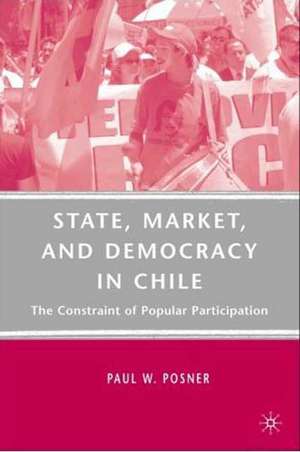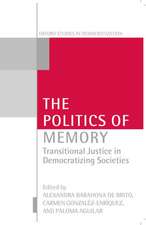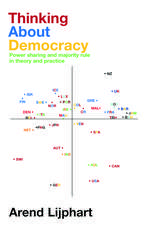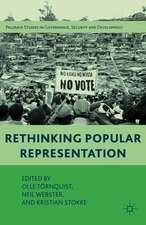State, Market, and Democracy in Chile: The Constraint of Popular Participation
Autor P. Posneren Limba Engleză Hardback – iul 2008
| Toate formatele și edițiile | Preț | Express |
|---|---|---|
| Paperback (1) | 383.50 lei 43-57 zile | |
| Palgrave Macmillan US – iul 2008 | 383.50 lei 43-57 zile | |
| Hardback (1) | 387.75 lei 43-57 zile | |
| Palgrave Macmillan US – iul 2008 | 387.75 lei 43-57 zile |
Preț: 387.75 lei
Nou
Puncte Express: 582
Preț estimativ în valută:
74.19€ • 77.67$ • 61.39£
74.19€ • 77.67$ • 61.39£
Carte tipărită la comandă
Livrare economică 07-21 aprilie
Preluare comenzi: 021 569.72.76
Specificații
ISBN-13: 9780230605954
ISBN-10: 0230605958
Pagini: 246
Ilustrații: XV, 246 p.
Dimensiuni: 140 x 216 x 19 mm
Greutate: 0.41 kg
Ediția:2008
Editura: Palgrave Macmillan US
Colecția Palgrave Macmillan
Locul publicării:New York, United States
ISBN-10: 0230605958
Pagini: 246
Ilustrații: XV, 246 p.
Dimensiuni: 140 x 216 x 19 mm
Greutate: 0.41 kg
Ediția:2008
Editura: Palgrave Macmillan US
Colecția Palgrave Macmillan
Locul publicării:New York, United States
Cuprins
Introduction The State in Society: Conceptualizing Collective Action and Popular Participation in Latin America Business, Labor, and the State: The Transformation of the State/Society Nexus Democratization, Political Representation, and the Rise of Popular Dissatisfaction Local Democracy and the Transformation of Popular Participation Social Welfare Reform and Impediments to Social Cohesion and Collective Action Neoliberalism, Democracy, and the Transformation of State-Society Relations in Argentina Neoliberalism, Democracy, and the Transformation of State-Society Relations in Mexico Conclusion
Recenzii
"In State, Market and Democracy in Chile, Posner argues that even in the competitive political environment characterizing the post-authoritarian period, neoliberalism, as a model of economic growth, erodes subaltern groups capacity for collective action. Indeed, he makes the point that the current consolidation of a democratic political regime in Chile rests, at least in part, on the silence of these groups. His focus on the participation and incorporation of the popular sectors in the new democratic institutional arrangements provides a revealing corrective to narrowly institutionalist and procedural interpretations common in much recent work on democracy in Latin America and elsewhere. Comparative chapters on Argentina and Mexico extend Posner s analysis and make this book important to anyone interested in the quality of democracy in Latin America." - William C. Smith, Editor, Latin American Politics and Society and Professor of Political Science, University of Miami
"This is a first-rate work that will be a most important contribution to the democracy/democratization debate.It is original in its angle, and a fitting complement to classical works on the subject like Gil's, Petras', or Valenzuela's. There is history, structures, dynamics, contextualization, fruitful comparisons, interviews with relevant actors, numerous examples, copious sources, and accessible theorizing on issues of development, democracy, and stability. The Chile he talks about seems more 'real' than the Chile described in other works from recent years." - Jorge Nef, Director, Institute for the Study of Latin America and the Caribbean, University of South Florida
"This provides a much needed conceptual framework required to analyze and interpret the connections between neoliberal economic policies and limited political participation in Chile and elsewhere in Latin America. The combination of an excellent review of the existing literature on state-society relations, a unique theoretical framework, and the sophisticated application of this framework to the analysis of a number of policies, including labor, social welfare policies and local and national representation, make this book truly valuable in the fields of Comparative and Latin American Politics." - Silvia Borzutzky, Professor of Political Science, Carnegie Mellon University
"This is a first-rate work that will be a most important contribution to the democracy/democratization debate.It is original in its angle, and a fitting complement to classical works on the subject like Gil's, Petras', or Valenzuela's. There is history, structures, dynamics, contextualization, fruitful comparisons, interviews with relevant actors, numerous examples, copious sources, and accessible theorizing on issues of development, democracy, and stability. The Chile he talks about seems more 'real' than the Chile described in other works from recent years." - Jorge Nef, Director, Institute for the Study of Latin America and the Caribbean, University of South Florida
"This provides a much needed conceptual framework required to analyze and interpret the connections between neoliberal economic policies and limited political participation in Chile and elsewhere in Latin America. The combination of an excellent review of the existing literature on state-society relations, a unique theoretical framework, and the sophisticated application of this framework to the analysis of a number of policies, including labor, social welfare policies and local and national representation, make this book truly valuable in the fields of Comparative and Latin American Politics." - Silvia Borzutzky, Professor of Political Science, Carnegie Mellon University
Notă biografică
PAUL W. POSNER is Assistant Professor of Political Science at Clark University, USA.


















